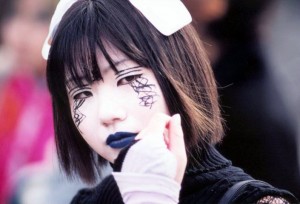No one does cute as well as the Japanese.
This is mainly because no one else thinks the idea of “cuteness” is as important as the Japanese do. European clothing comes in two basic colors “dark” and “not as dark” as Europeans try to appear sophisticated and/or imagine they are invisible in dark alleys. In the USA we’re running through our collections of university sweatshirts and beer brand t-shirts because we got suckered into going to college for degrees in Antarctic Poetry and Elvis Studies. (Oh, like you didn’t consider those.)
In Japan, though, cuteness is a martial art. Only Japan could make a perfect family movie like Totoro, which has a cute monster and no villain and yet still manages to have tension. Even the dust balls are cute in Totoro.
Also, only someone from Japan would have this conversation:
A-san: I’m sick of all the doom and gloom in heavy metal.
B-san: Me too. It makes me so depressed I got another skull tattoo. But what should we do?
A-san: Let’s take a heavy metal band and front it with cute teenaged Gothic lolitas
B-san: What would they sing about?
A-san: Chocolate.
The result is the annoyingly cute Babymetal. (And they actually do have a song about chocolate.)
What strikes me about Babymetal is that it’s a concept that couldn’t work if the girls were from the West. We would be more prone to turn them into Cherie Currie or dress them in European black to show how they are serious musicians. They’d only dress like Gothic lolitas to be ironic.
Even when the Japanese try to dress gothic and dark, they’re still pretty cute:
This propensity for cuteness for cuteness’ sake effects even the all-boys school where I work. Last year one of my biggest troublemakers went for the shirt untucked, loose tie, loose trousers look. He even attempted a greaser pompadour. The effect, though, was ruined (from a Western perspective) by the chain full of cute stuffed animals he carried around with him.
I’ve seen another boy with a similar look but with Dragon Ball hair. He had a Hello Kitty doll hanging off his belt.

